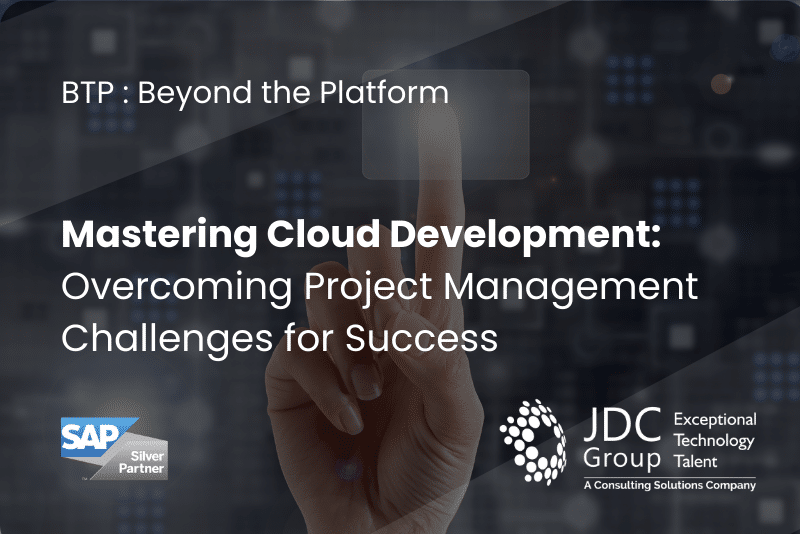Cloud technology has revolutionized the IT landscape, offering unprecedented scalability, flexibility, and cost-saving opportunities. However, managing a cloud development project is not without its challenges. This post focuses on some of the fundamental project management issues like scope control, budget control, and quality control that can arise, along with some tips on how to mitigate them.
Scope
In a cloud project, the dynamic and evolving nature of technology can often lead to “scope creep,” which refers to changes or continuous growth in a project’s scope. For example, let’s assume your team is building a cloud-based solution that allows you to validate all customer addresses before they’re added to the system, but halfway through the project, the business users request that the solution include chatbot-like features using AI. And why not? AI is everywhere nowadays and chatbots seem to dominate user interactions. But this unplanned addition, while enticing and valid, expands the project’s initial scope, threatens the timeline, and increases costs. Be aware that migrating to the cloud opens you to a world of innovations that can happen quite fast. But you still need to manage your scope in traditional ways or you will be stuck in the design or realization phases forever. Emphasize to your team and stakeholders that changes need to be structured and incremental. And as cloud technology evolves, make sure your solution remains flexible and adaptable without having to incur significant technical debt.
Cost
Sure, you received some cloud credits when you acquired your S/4HANA licenses. You may have credits from a hyper-scaler as well. But do you really understand how cloud licensing and costing works? Have you really considered the cost of all the services that would be needed to build and run your applications? What about the users and instances that need to be set up? And the cost of your pipeline setup and maintenance? Cloud costs can quickly spiral out of control due to inefficient resource usage, lack of visibility into spending, or the complexity of cloud pricing models. The cost benefits of cloud technology can be overshadowed by budget overruns if not managed properly. Detailed planning and realistic cost estimations are key. In fact, it is important to have a good understanding of these things up front. Monitor expenses closely throughout the project and have a contingency plan in place. Utilize cloud cost management tools to gain visibility into your cloud spending and optimize costs.
Resources
Does your team have all the skill sets required for a successful cloud project? Have you invested enough time in upskilling your workforce? What about your partners? Does your team know what they need to do to leverage the wonderful world of cloud or are they just duplicating what they have done for the last few decades? You need to implement a robust plan that considers the skills and capabilities of your team and your partners. Leverage your network to attract the right resources for the job and invest in your team to prepare them for the cloud journey.
Quality
Quality control in cloud projects, unlike traditional on-prem projects, presents unique challenges due to the very nature of cloud environments. The enormous scalability of cloud services, unpredictable load fluctuations, and critical data privacy concerns can all make traditional testing methods seem inadequate. However, these challenges can be effectively addressed with the right approach and tools. Automated testing tools designed specifically for cloud environments can manage the expansive scalability and fluctuating loads. Implementation of continuous integration and continuous delivery (CI/CD) pipelines can streamline the development process, making testing and deployment more efficient. It is important to frequently monitor performance and analyze results to ensure quality control measures are working as planned. Cloud projects are not just about transferring tasks to a different platform; they require a novel approach to project management and quality control to ensure success.
Time Management
Cloud development projects, like building a multi-tenant SaaS application, can struggle with time management hurdles. These challenges often grow from unforeseen technical glitches, such as dealing with security that were not originally accounted for during project planning. Cloud services are often deprecated, retired, or changed based on technology evolution—requiring application redesign and leading to unstable solutions. These unexpected detours can cause deviations from the planned timeline. Using Scrum to provide updates and asking for help when needed, being diligent about breaking down development tasks properly, and taking time to proactively address critical topics can help manage potential delays. Factoring in buffer times within this schedule serves as an additional cushion against such surprises. Ensuring regular team interactions and maintaining transparency about the project’s progress help keep everyone aligned with the evolving timeline, steadily steering the team toward successful delivery.
Stakeholder Involvement
Stakeholder engagement in cloud projects can be a tightrope walk, particularly because stakeholders might be accustomed to the catered services of on-prem systems and in-house IT organizations tailored solutions to their desires. However, the world of cloud computing operates on standardized business processes, requiring a shift in stakeholder expectations. Unmanaged expectations can lead to stakeholder discouragement, misaligned objectives, and overlooked requirements. An effective communication strategy as well as involving stakeholders in decision-making processes can foster a sense of ownership in the project’s outcome.
Effective cloud project management is a nuanced blend of understanding cloud technologies and implementing basic project management principles. It requires vigilance toward potential issues and proactivity in offering solutions. Despite its complexities, the cloud journey, with proficient project management, is not only worth embarking upon but can also lead to rewarding destinations.
JDC Group, a Consulting Solutions company, is one of North America’s fastest-growing SAP Strategic Consulting and Advisory Services providers. JDC Group has earned a reputation among its clients for being a trusted business partner for supporting major SAP transformation programs to drive operational and financial success. JDC Group’s Business Technology Platform (BTP) Development Services brings extensive SAP experience and knowledge to address our customers’ business challenges and can help with their cloud transformation journeys. To learn more, visit www.jdc-group.com.
